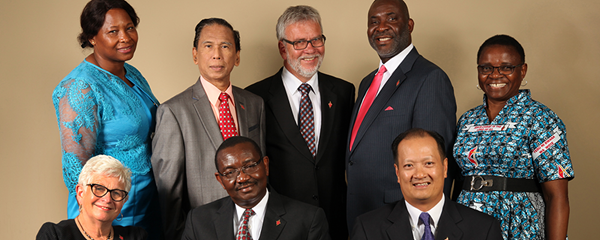The United Methodist Church’s top court will not rule in advance on the constitutionality of proposed legislation that would provide a way for some to separate from the denomination.
In Memorandum 1407, the Judicial Council declined jurisdiction in response to a request from the United Methodist Council of Bishops about the proposed Protocol of Reconciliation and Grace Through Separation.
Your support of The General Administration Fund apportionment supports the legislative body of the denomination, the Judicial Council.
The protocol legislation will remain in the hands of the next General Conference. The denomination’s top legislative meeting — postponed twice because of the pandemic — is now rescheduled for Aug. 29-Sept. 6, 2022.
Normally, the Judicial Council’s nine members — who live in the U.S., the Philippines, Liberia, Mozambique and Norway — meet together at different locations around the U.S. Near the end of 2020, the Judicial Council announced on its website that its members would begin online deliberations on the postponed Spring 2020 docket, along with an additional four items. Those Zoom sessions will continue until the entire 19-item docket is addressed.
The Protocol of Reconciliation and Grace Through Separation, made public in January 2020, was created by a diverse group of representatives from United Methodist advocacy groups and several bishops.
The self-appointed group created the plan after a contentious 2019 special General Conference in St. Louis reinforced church bans on same-gender weddings and “self-avowed practicing” gay clergy, while leaving the divisions in the denomination unresolved.
In Memorandum 1407, the Judicial Council noted that since the Council of Bishops has neither approved nor endorsed the proposed protocol it is seeking a declaratory decision “as an interested party but not in its capacity as a governing body of the Church.”
With no record of the protocol being adopted either by General Conference or the bishops, it is “simply proposed legislation and stands in the same position for jurisdictional purposes as any other proposed legislation” not adopted by those bodies, the court said.
To determine the timeliness of the bishops’ petition, the Judicial Council said it considered the authorship and history of the proposed legislation and whether “it rests upon contingent future events.” The court also found the authors of the protocol to be “fundamentally different” from the Commission on a Way Forward, a group authorized by the 2016 General Conference.
“Until the General Conference has the opportunity to consider and act on all proposals, including the Protocol, we must avoid interfering with the legislative process through premature adjudication,” the Judicial Council said in its ruling.
excerpt from a story by Linda Bloom, retired assistant news editor, UMNS.
One of seven apportioned giving opportunities of The United Methodist Church, the General Administration Fund implements trustworthy administrative oversight, supports the legislative processes of the church and curates The United Methodist Church’s rich history. Please encourage your leaders and congregations to support the General Administration Fund apportionment at 100 percent.





